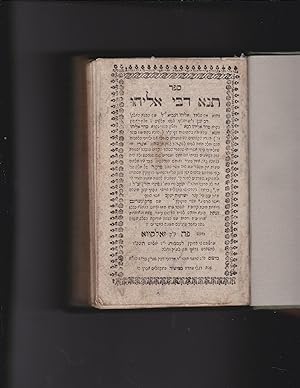About this Item
In Hebrew. 98, 40 leaves. Vinograd #519. Tana D'vei Eliahu is the composite name of a midrash, consisting of two parts, whose final redaction took place at the end of the 10th century C.E. The first part is called "Seder Eliyahu Rabbah" (31 chapters); the second, "Seder Eliyahu Zuta" (15 chapters). A distinct reference to this midrash occurs in the Talmud in Ket. 106a: "Elijah used to come to R. Anan, upon which occasions the prophet recited the Seder Eliyahu to him. When, however, R. Anan had given this decision [one previously narrated in the Talmud] the prophet came no more. R. Anan fasted in consequence, and begged forgiveness, whereupon the prophet came again; but R. Anan had such great fear of Elijah that, in order to avoid seeing him, he made a box and sat in it until the recitation was over." according to Rashi, the midrash has the two names, "Rabbah" for the earlier, and "Zuta" for the later lectures. Anan was a Babylonian amora of the 3rd century. The collection of baraitot concerning him, referred to in this midrash, is cited in the Babylonian Talmud under the title "Tanna debe Eliyahu" (see below), and the utterances in question are found in the midrash itself. The tosafot to Ketubot (106a, s.v. ??????) say that the midrash consists of a large book and a small one. R. Nathan ben Jehiel in his Aruk (s.v. ???, ii.) says: "The midrash contains baraitot which the prophet taught to Anan, and consists of two parts, a large seder with 30 chapters, and a small seder with 12 chapters; and all of the Tanna debe Eliyahu cited in the Talmud is to be found in these baraitot." The inner connection between these two midrashim is a loose one, and it is only in sections 5 to 10 that the second refers to the first. The underlying theme of the Tanna debe Eliyahu, which, with many interruptions, runs through the whole work, is the evolution of the world-system. The midrash calls the single periods of the history of man "shittot" (series). The first series, which deals with the beginning of the world and extends to the moment when man was driven out of Eden, consists of two subsections, (a) "Ma'aseh Merkabah" and (b) "Ma'aseh Bereshit." The six series of the world-system, however, were created in the divine mind even before any being, with the exception of Israel, existed. The Tanna debe Eliyahu is the only haggadic work which contains a rabbinic-karaitic polemic. In the second chapter of the second part is an account of a meeting of the author with a Karaite, who possesses a knowledge of Jewish Scripture, but not of the Mishnah; the differences discussed, however, are not important. The polemical attitude is much more noticeable in ch. xv. of the first part. The first published edition of this midrash appeared at Venice in the year 1598, prepared from a copy dated 1186. Seller Inventory # 014327
Contact seller
Report this item
![]()




